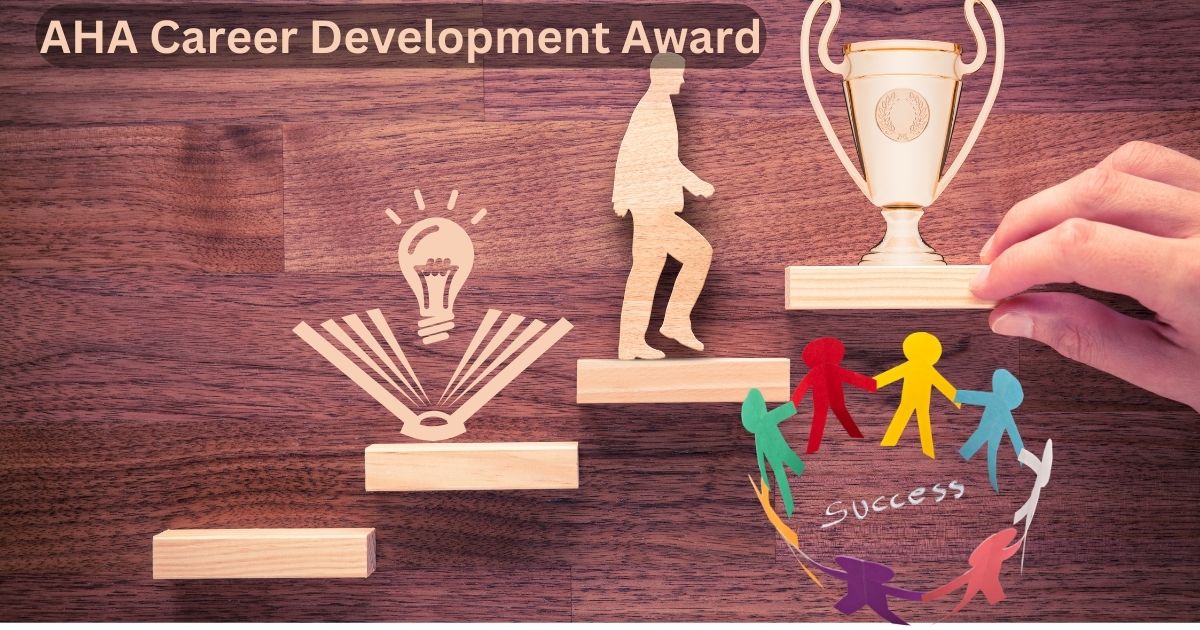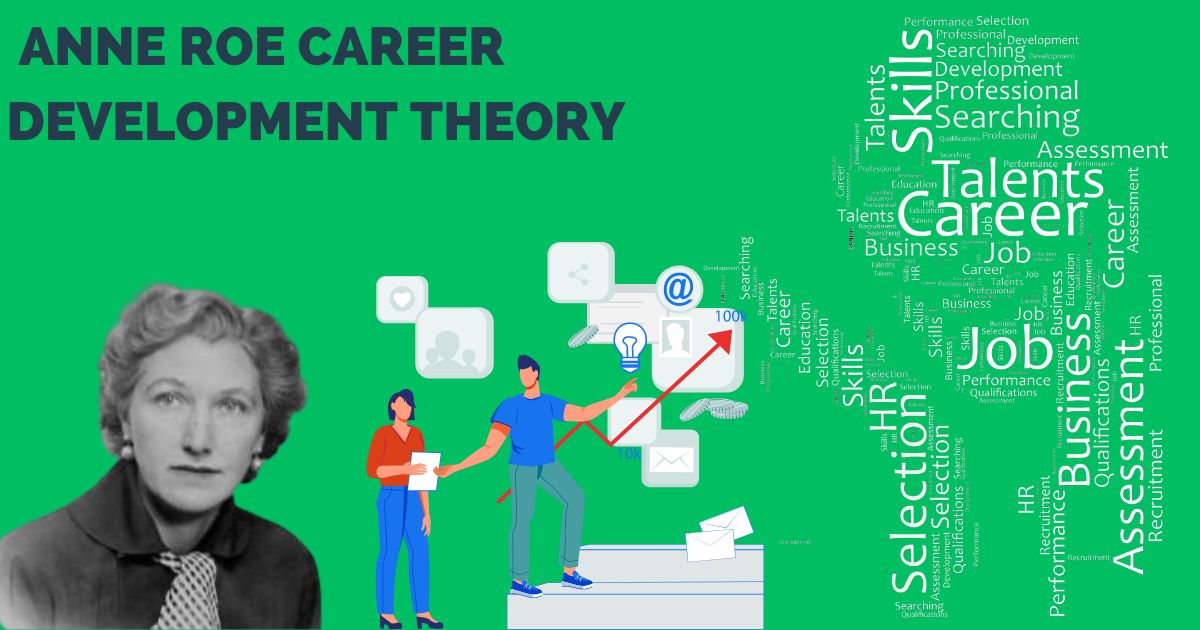Comprehensive Guide to Career Development: Key Points and Strategies
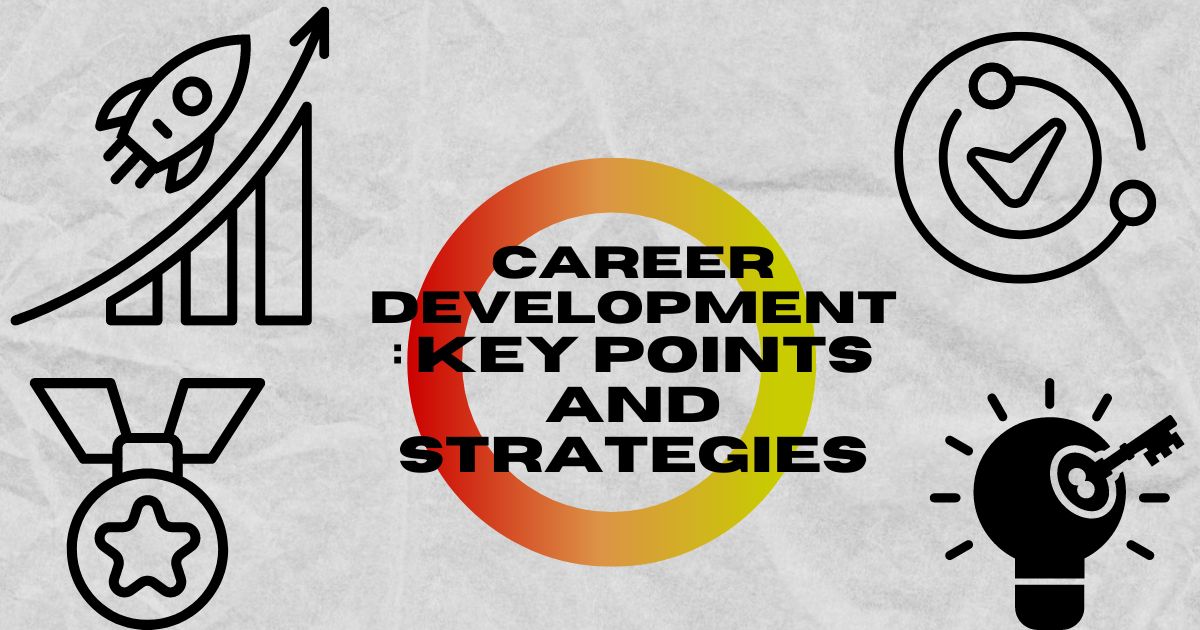
Introduction
Career Development: Key Points and Strategies
Career development is a continuous process that requires careful planning, self-assessment, and steady effort. Whether you’re just beginning or looking to advance in your current field, understanding the key stages steps career can help you explore your professional journey more successfully. This guide will walk you through the basic stages of career development, outline actionable steps, and give tips to help you accomplish your career goals.
Stages of Career Development
Career development typically unfolds in several stages. Each stage is characterized by different activities and goals, which help you progress toward a fulfilling and successful career.
Exploration
The exploration stage includes testing different career choices to find what matches your skills, values, and interface. This stage often starts with higher education, internships, and entry-level jobs. During investigation, you should remain curious and open-minded, attempting out different roles to understand what you enjoy and where your strengths lie. It’s a period of learning from both triumphs and failures, which helps you gather valuable experiences about yourself and the professional world.
Establishment
Once you have identified a career way that adjusts with your interests and skills, you enter the foundation organize. This stage is about committing to a particular career way and building a solid professional reputation. You’ll center on gaining footing inside your chosen field, accomplishing work security, and seeking after upward versatility. The foundation arrange includes developing your expertise, expanding your obligations, and potentially mentoring others. Success in this stage is checked by noteworthy turning points such as promotions, administration roles, and outstanding extend completions.
Maintenance
The maintenance stage ordinarily happens from mid-career ahead. At this point, your focus shifts to sustaining your established position, updating your skills to keep pace with changes, and maintaining a solid professional network. Whereas there may be less accentuation on quick career headway, it’s still pivotal to remain locked in, proceed learning, and contribute definitively to your field. The maintenance stage also offers openings to tutor others and share the riches of knowledge and experience you’ve accumulated.
Decline
The decline stage happens as you approach retirement. This period includes a slow reduction in workload and obligations, but it can still be wealthy in mentoring and counseling roles. Planning for this stage financially and sincerely can lead to a satisfying move into retirement, where you can reflect on your career achievements and appreciate the fruits of your labor.
Steps to Career Development
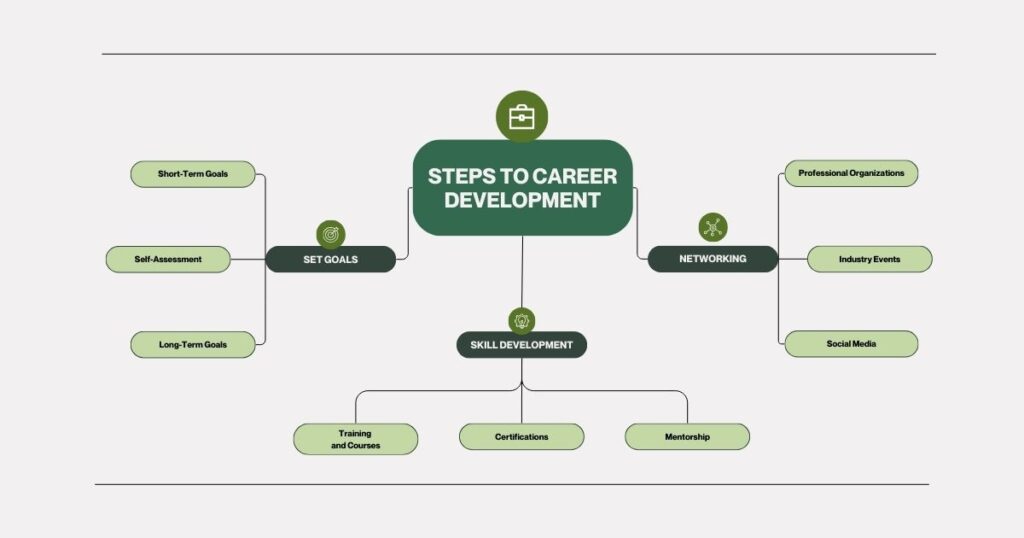
Steps to Career Development
Effective career development requires a structured approach. By following these steps, you can create a roadmap for professional growth and achieve your career goals.
Self-Assessment
The first step in your career development journey is self-assessment. This includes assessing your strengths, weaknesses, abilities, identity sort, interface, and values. Self-assessment makes a difference you get it your fit with different career ways and recognize ranges where you require advancement. Apparatuses like identity tests, expertise evaluations, and career intrigued inventories can be helpful in this process. Reflect on your past encounters to identify patterns in your inclinations and execution. Understanding these aspects of yourself is basic for setting realistic career goals that adjust with who you are.
Goal Setting
Once you have got deeper information about yourself, it’s time to set clear, possible dreams. Recognize each quick-term desire that may be fulfilled within a few months or years and long-term objectives that can take several years to perform. Be particular when placing your goals to make them achievable. Your goals should be distinct, quantifiable, and paired with a closing date. Consider what victory looks as if to you, whether it is coming to a certain role, achieving an ability, or attaining work- lifestyles adjust. Keep in thoughts that your goals may additionally advance as you develop, both professionally and personally.
Action Planning
Action planning includes breaking down your career desires into manageable, achievable errands and developing a timeline for completing them. For example, if you need to procure a new skill, your activity plan may include researching training programs over another week, selecting courses by the conclusion of the month, and executing the modern ability in your career in another quarter. By breaking down your goals into little tasks, you can make steady progress toward your career goals.
Implementation
The implementation step includes acting on your plan and pursuing the vital steps to achieve your goals. This may include selecting in courses, attending workshops, organizing with experts, and looking for feedback from mentors and peers. Consistent exertion and commitment are key to effectively implementing your career development plan.
Refinement
Regularly review and adjust your career plans to remain adjusted with your advancing objectives and circumstances. As you pick up unused encounters and insights, you may be required to refine your goals and activity plans. Please keep an eye on your advance and be flexible in adapting to changes in your interests and the work market.
Professional Development Goals
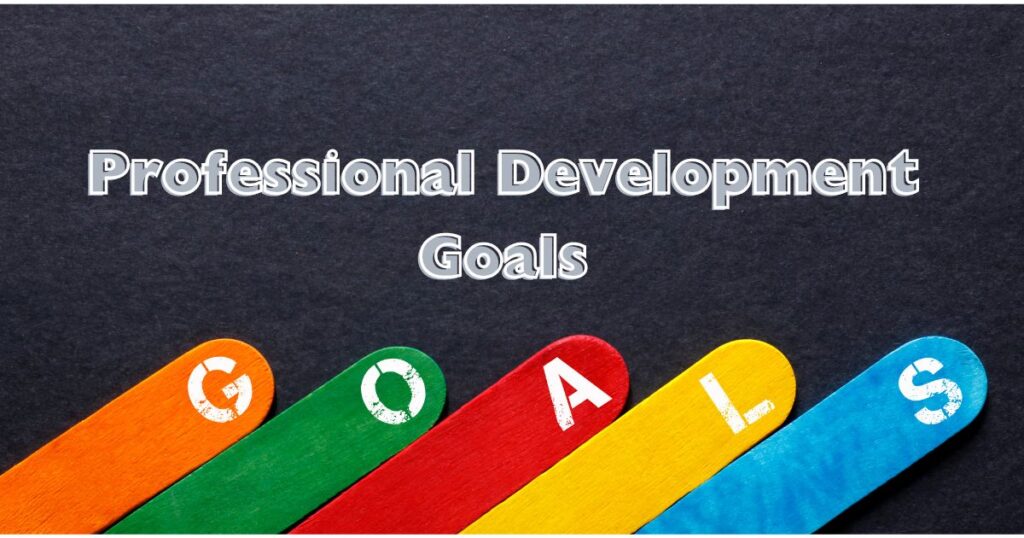
Professional Development Goals
Setting professional development goals is crucial for advancing your career. Here are some examples of goals that can help you grow professionally.
Skill Enhancement
Regularly improving your skills is basic for career growth. This can be achieved by reading books, taking courses, attending workshops, and tuning in to podcasts related field. For instance, you might set a goal complete course on important topic within quarter or read two books field each month.
Networking
Building professional relationships is imperative for career advancement. Engage with peers and industry experts by attending occasions, joining proficient organizations, and participating in online forums. Networking can open up modern openings, give profitable insights, and help you discover mentors who can direct your career growth.
Job Satisfaction
Improving job satisfaction is critical for long-term career success. Focus on accomplishing work-life adjust, forming fulfilling connections with associates, and taking care of your mental and physical wellbeing. Set objectives such as planning standard breaks, joining workplace interest groups, and clarifying boundaries on work expectations exterior of working hours.
Shadowing and Mentorship
Shadowing other departments and finding mentors can give new perspectives and valuable guidance. Set objectives to shadow colleagues in distinctive parts, make programs to energize cross-team shadowing, and discover mentors who can offer assistance you explore workplace challenges and progress in your career.
Employee Development Areas
Continuous improvement in various areas can enhance your career development. Here are some key areas to focus on.
Formal Training
Participate in structured training programs to develop specific skills. Formal preparing can incorporate workshops, classes, certifications, and short-term courses that help construct your skill set for a particular job or industry.
Group Projects
Engage in cross-functional projects to improve communication and teamwork. Working on group projects can bring out the best in individuals and teams, promoting team spirit and honing interpersonal skills.
Feedback Sessions
Seek and provide constructive feedback to foster continuous improvement. Offering and accepting feedback positively can lead to significant skill development and better performance. Focus on delivering criticism as constructive feedback and encourage a two-way exchange of ideas.
Leadership Skills
Develop leadership abilities through mentorship, preparing, and practical experience. Leadership skills such as conflict determination, tactfulness, work ethic, and polished skill can be created through formal training and real-world practice.
Tips for Career Development
Here are some additional tips to help you navigate your career development journey.
Embrace Both Formal and Informal Learning
Combine formal education and certifications with informal learning like mentorship and networking. This blended approach ensures you have updated information relevant to your career journey and helps you develop a well-rounded skill set.
Stay Proactive
Independently seek out career development opportunities through online resources, networking, and continuous learning. Be proactive in finding and utilizing resources that can help you grow professionally.
Adaptability
Be willing to adjust your career goals and plans based on new experiences and changing interface. The job market and your individual interface may advance over time, so it’s vital to stay flexible and open to new opportunities.
FAQs For Career Development: Key Points and Strategies
Q1: How can I apprehend my strengths and weaknesses for career development?
A: Self-assessment tools inclusive of identification checks, capability evaluations, and career hobby inventories let you perceive your features and shortcomings. Reflecting on beyond stories and seeking feedback from friends and coaches also can give worthwhile insights.
Q2: What are Smart desires, and the way are they practices for career improvement?
A: Smart goals are Particular, Quantifiable, Achievable, Significant, and Time-sure. They give a clear system for putting and accomplishing career targets by making certain that every aim is nicely described and viable within a specific time frame.
Q3: How important is networking for career development?
A: Networking is pivotal for career improvement as it helps you build professional relationships, gain new insights, and open up openings. Locks in with peers, industry specialists, and guides can give valuable direction and support throughout your career journey.
Q4: What are some successful ways to improve job satisfaction?
A: Improving work satisfaction can be accomplished by centering on work-life adjust, forming satisfying relationships with associates, and keeping up mental and physical wellbeing. Setting objectives for standard breaks, joining workplace intrigued bunches, and clarifying work expectations can also contribute to work satisfaction.
Q5: How can I stay proactive in my career development?
A: Staying proactive includes seeking out career advancement opportunities through online resources, organizing occasions, and persistent learning. Be proactive in finding and utilizing assets that can help you grow professionally and adapt to changes in the work market.
Conclusion
Career development is a continuous and dynamic process that requires self-assessment, goal setting, activity planning, execution, and refinement. By understanding the stages of career advancement and centering on key regions such as ability enhancement, networking, job satisfaction, and mentorship, you can explore your proficient journey more successfully. Remember to stay proactive, embrace both formal and informal learning, and stay versatile to changes in your interests and the work showcase. By taking after these methodologies, you can accomplish your career goals and build a fulfilling and fruitful career.




